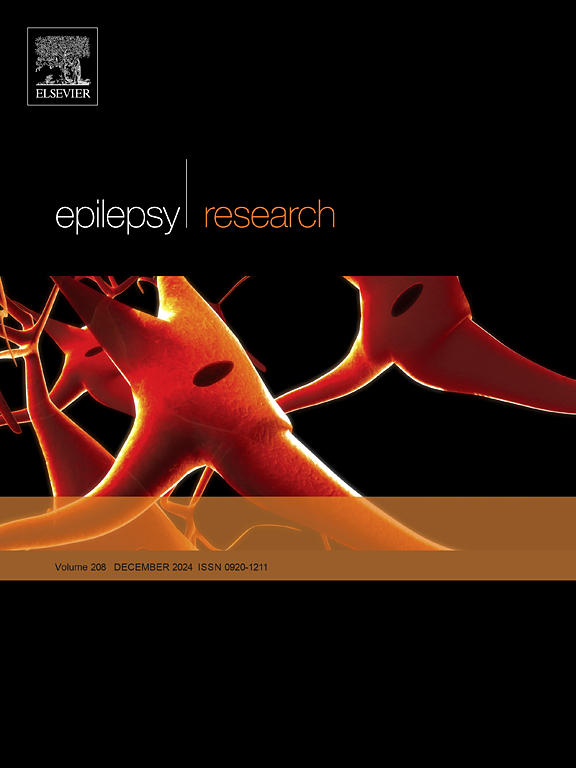家族性局灶性癫痫单基因形式的精神病特征和对抗精神病治疗的反应:系统回顾。
IF 2
4区 医学
Q3 CLINICAL NEUROLOGY
引用次数: 0
摘要
虽然癫痫的遗传结构很复杂,而且在许多情况下可能是多基因遗传,但致病变异体已被越来越多地发现,单基因家族性局灶性癫痫可能就是最好的例证。虽然癫痫(尤其是局灶性癫痫)患者罹患精神病的风险会增加,但有关单基因家族性局灶性癫痫的研究却很少。因此,本系统综述旨在描述受影响患者的精神病现象(以及对抗精神病药物治疗的反应)。结果只发现了八篇文章,而且大多数文章都只提供了极少的精神病表型方面的信息。因此,虽然无法得出肯定的结论,但值得注意的是,没有一篇报告描述了癫痫发作与精神病发病之间的时间关系;这是癫痫中使用的典型惯例。由于大多数报告也没有包括原发性精神病的诊断,因此目前仍不清楚这些人的表现是代表癫痫性精神病还是精神分裂症,也不清楚他们的基因变异在多大程度上(如果有的话)被认为直接导致了精神病风险。要更好地描述单基因家族性局灶性癫痫患者精神病症状(及其对治疗的反应)的性质,还需要更有力的病例描述。本文章由计算机程序翻译,如有差异,请以英文原文为准。
The characterization of psychosis and response to antipsychotic therapy in monogenic forms of familial focal epilepsy: A systematic review
While the genetic architecture of epilepsy is complex and presumably polygenic in many cases, pathogenic variants have increasingly been identified, and this is perhaps best exemplified by the monogenic familial focal epilepsies. Although individuals with epilepsy (particularly focal epilepsy) are at increased risk of developing psychosis, little has been written on this topic in relation to monogenic familial focal epilepsy, specifically. As such, this systematic review aimed to characterize the phenomenology of psychosis (and response to antipsychotic therapy) in affected individuals. Only eight articles were identified and minimal information with respect to psychiatric phenotyping was provided in most cases. As such, although no firm conclusions can be drawn, it is notable that none of the reports described a temporal relationship between seizure and psychosis onset; the typical convention used in epilepsy. As most reports also did not include primary psychotic disorder diagnoses, it remains unclear if the individuals’ presentations were understood to represent epileptic psychoses or schizophrenia, and to what degree (if at all) their genetic variants were thought to have contributed directly to psychosis risk. More robust case descriptions are needed to better characterize the nature of psychotic symptoms (and their response to treatment) in monogenic familial focal epilepsy.
求助全文
通过发布文献求助,成功后即可免费获取论文全文。
去求助
来源期刊

Epilepsy Research
医学-临床神经学
CiteScore
0.10
自引率
4.50%
发文量
143
审稿时长
62 days
期刊介绍:
Epilepsy Research provides for publication of high quality articles in both basic and clinical epilepsy research, with a special emphasis on translational research that ultimately relates to epilepsy as a human condition. The journal is intended to provide a forum for reporting the best and most rigorous epilepsy research from all disciplines ranging from biophysics and molecular biology to epidemiological and psychosocial research. As such the journal will publish original papers relevant to epilepsy from any scientific discipline and also studies of a multidisciplinary nature. Clinical and experimental research papers adopting fresh conceptual approaches to the study of epilepsy and its treatment are encouraged. The overriding criteria for publication are novelty, significant clinical or experimental relevance, and interest to a multidisciplinary audience in the broad arena of epilepsy. Review articles focused on any topic of epilepsy research will also be considered, but only if they present an exceptionally clear synthesis of current knowledge and future directions of a research area, based on a critical assessment of the available data or on hypotheses that are likely to stimulate more critical thinking and further advances in an area of epilepsy research.
 求助内容:
求助内容: 应助结果提醒方式:
应助结果提醒方式:


